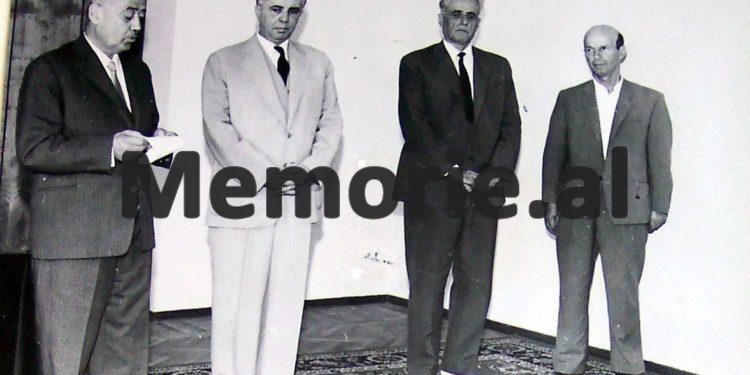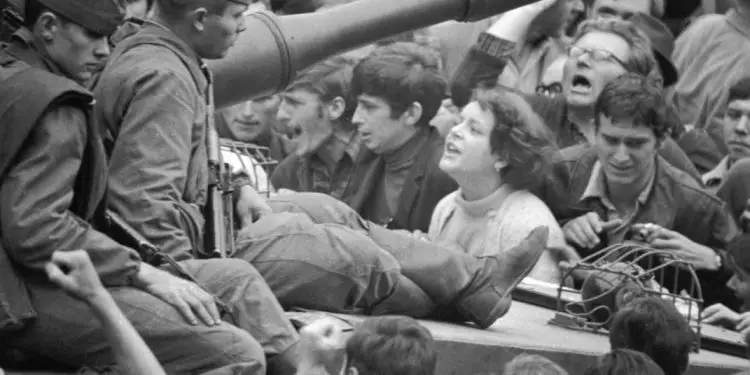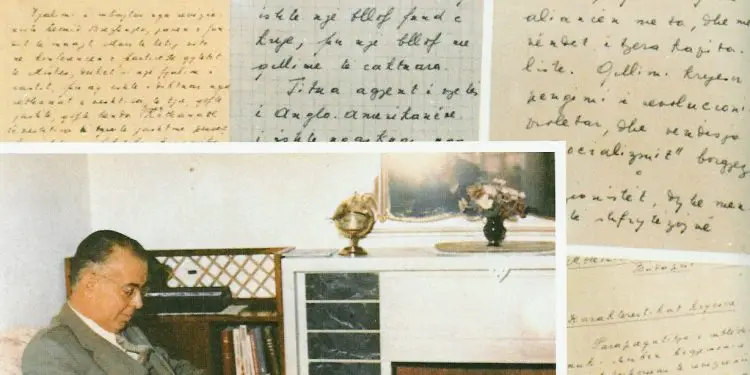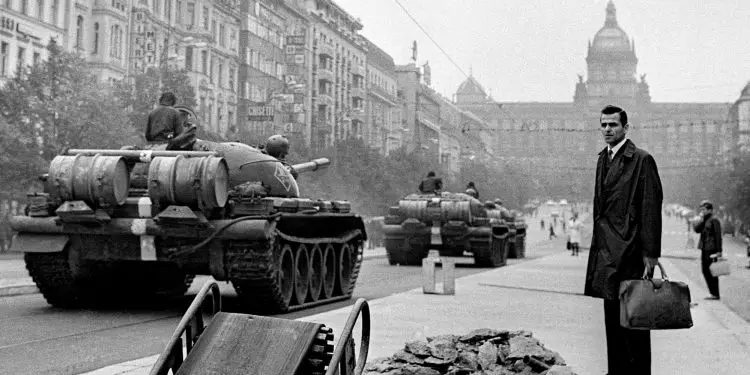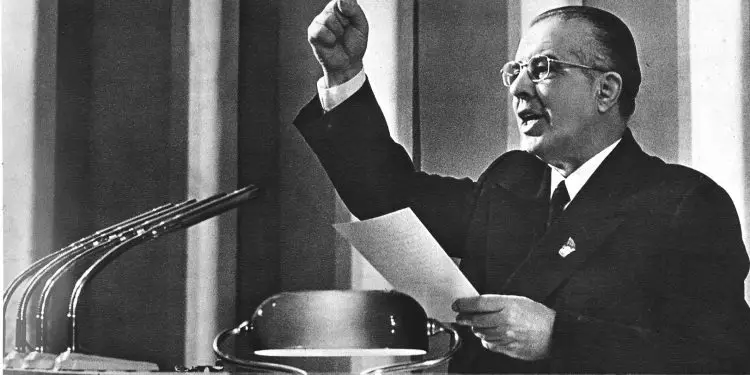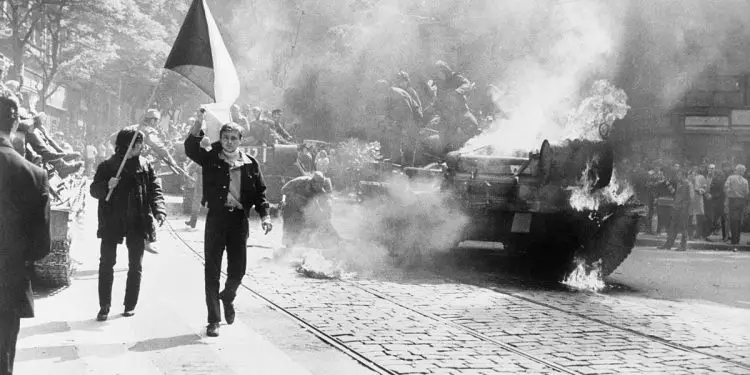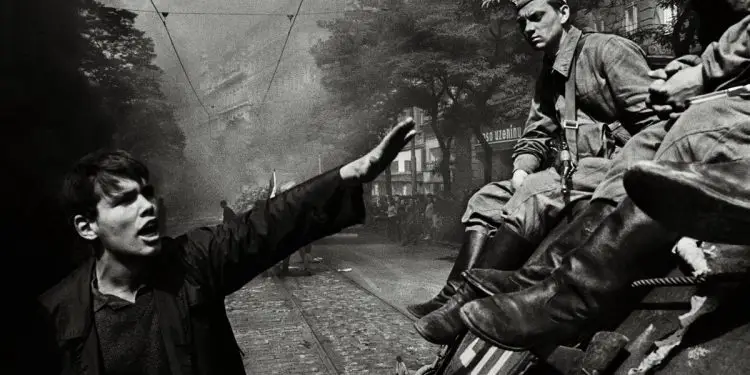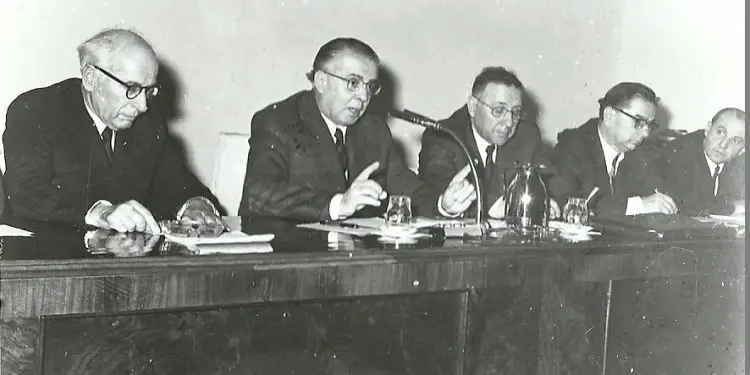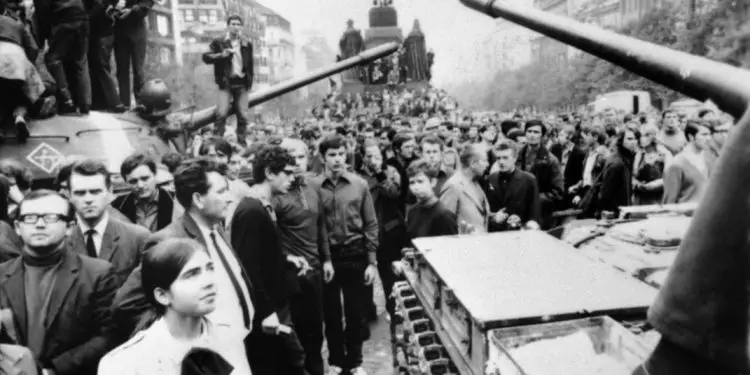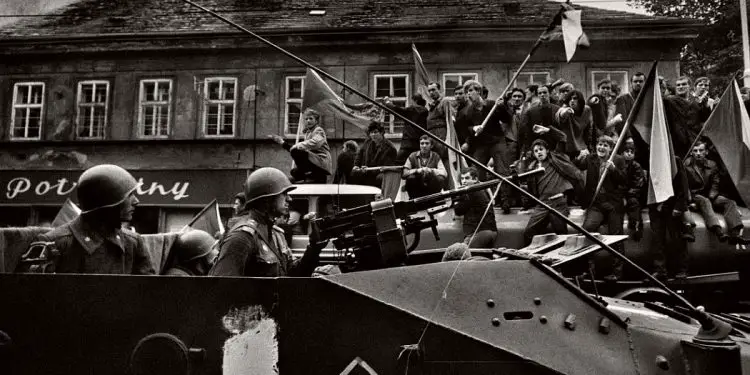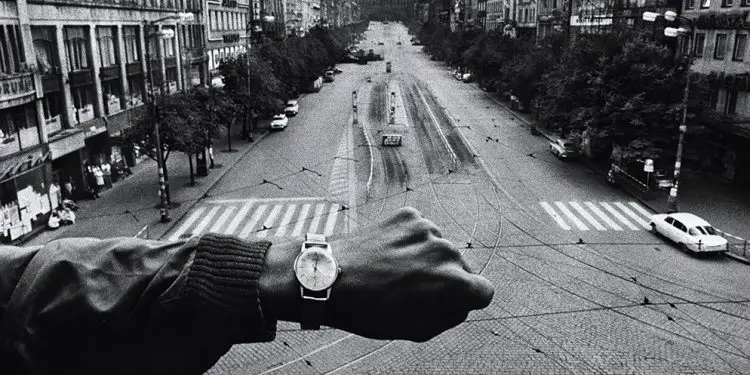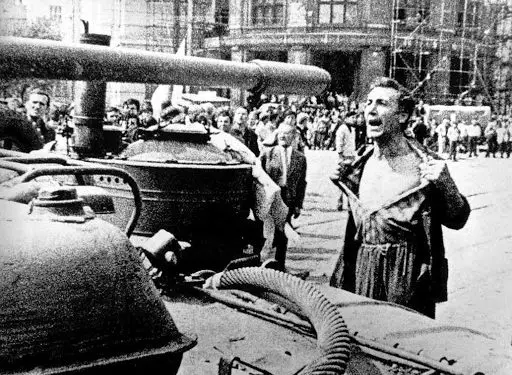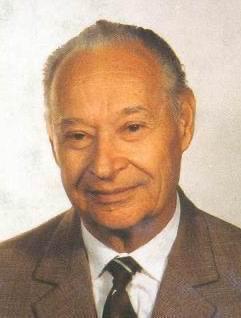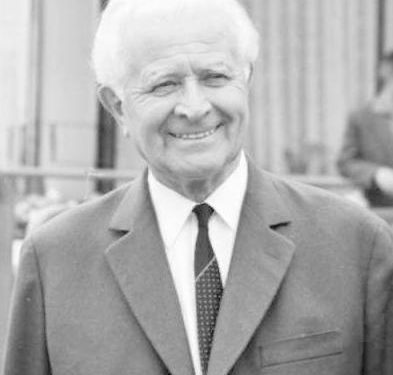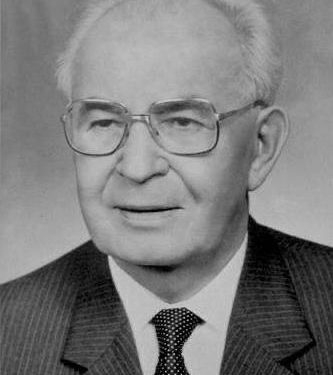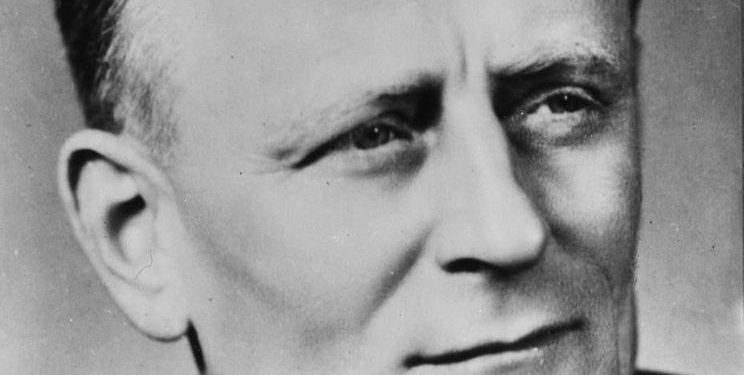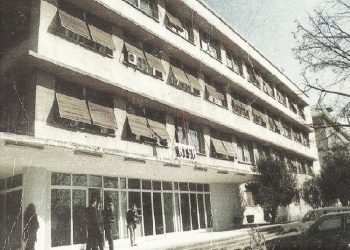Dashnor Kaloçi
Memorie.al publishes some archival documents extracted from the Central State Archive in Tirana (fund of the former Central Committee of the ALP), which also contains the diary of Enver Hoxha, who has kept notes and made analysis of the events in Czechoslovakia from January 1968 until August 21 of that year, when Soviet troops, along with those of the other four Warsaw Pact countries (East Germany, Poland, Hungary and Bulgaria), carried out military aggression, invaded Czechoslovakia. All the unknown notes of the leader of communist Albania regarding the events in Czechoslovakia, from the position of other Eastern European countries, part of the “Warsaw Pact”, to that aggression, the accusations against Ceausescu, Josif Broz Tito, etc., comments and the accusations against the USA, Enver’s articles in the newspaper “Zeri i Popullit” about all those events, the messages he gave to Haxhi Lleshi for his Bulgarian counterpart, and even the intensification of the propaganda that made official Tirana by all means information, to unmask the Soviet military aggression against Czechoslovakia, which extended to popular folklore. Thus, from that time, among others, the song of the group of men of Vranisht of Vlora is remembered (one of the most famous groups of Labëria), where among other things it was said: in Prague”.
“Soviet, Polish, German, Hungarian and Bulgarian revisionists entered from all four sides of the Czechoslovak border and, overnight, occupied Prague, seized the radio, surrounded the government building, the Central Committee, the Parliament, the the president and no rifles were heard. Not only that, but the Czechoslovak revisionist leaders ordered the army and the people to “remain calm and calm”, according to the “tradition of their character”. As for Romania’s aid, according to the treaty, there is no need to go too far: Romanian revisionists have done it in their panties and the world will soon stink. Of course we are still in the first moments and events will definitely take place. Soviet revisionists did a desperate, deadly act for them. They were discredited from all sides, even to their revisionist friends, because most of them do not agree with this brutal act with serious consequences for them. But the Soviet revisionists did not do this desperate action out of longing, but out of grief, knives came to their throats. Certainly in the midst of the Soviet revisionist leadership, there will be changes, there will be sacrifices. Who are they? Will see. Who will remain? The military must have a hand in these events and their point of view has prevailed. All this development will aggravate the international situation and there is a possibility that the revisionist-capitalist opinion will be alarmed. Contradictions will deepen, the waters in the stinking swamp of peaceful coexistence will be disturbed, and the Russian-American alliance, if not cracked, will suffer serious scratches. World opinion, fears, doubts will play their part. “Revisionists, whether they are from or not, will become quarrelsome with each other, wool and linen, worse than what they have done.” This is what the Albanian communist leader Enver Hoxha wrote in his diary on August 21, 1968, about the event that took place in the morning of that day, when the Soviet Union under the leadership of Leonid Brezhnev, together with the military forces of the four countries other “Warsaw Pact” (East Germany, Poland, Bulgaria and Hungary), carried out military aggression against Czechoslovakia, inserting tanks as far as the center of Prague. This event was considered and was the most serious in all of Eastern Europe, after what happened in Hungary in 1956, where Soviet troops intervened to extinguish what they labeled the “Hungarian Counter-Revolution”. As we will see from Enver Hoxha’s diary, the occupation of Czechoslovakia by Russian troops and its allies in the “Warsaw Pact” could not but alarm the communist regime in Albania, as official Tirana feared a “domino effect”. as had happened not infrequently in history with such events. But the fear and panic that gripped Enver Hoxha and all of Tirana’s top communist leadership at the time, of a possible invasion of Albania by the Soviet Union and other Warsaw Pact countries, seems little or not at all. has taken place in Enver’s diary ?! After that, the communist regime was put on a great alarm, starting from the Army that passed to “readiness no. 1” (as in a state of war), but also the volunteer and reserve forces were mobilized, which took part in major exercises that began at that time by the largest units of the Albanian army, such as the Corps. Likewise, the civilian population of villages and towns responded to air or ground alarms (signaling with sirens or bells), placing them in underground shelters (tunnels) located inside or on the outskirts of cities. Also at that time, official Tirana intensified all means of information and mass propaganda, to unmask the Soviet military aggression against Czechoslovakia, which extended to popular folklore. Thus, from that time, among other things, the song of the Men’s Group of Vranisht of Vlora (one of the most famous groups of Labëria) is remembered, where among other things it was said: “Should I find a wave on my shoulder / we do not in Prague ”. But all these above, were only the obvious and quite normal side for a country like communist Albania of that time, because in the same situation were and acted more or less neighboring countries, such as Yugoslavia, etc. While what is little known is the fear that invaded Enver Hoxha and the communist regime, from a movement that could happen from within the country. This is noticed and confirmed, among other things, by a large number of archival documents (fund of the former Central Committee of the ALP), where the Ministry of Internal Affairs and State Security, inform the Central Committee of the ALP and Its main leaders, Enver Hoxha, Hysni Kapon, Ramiz Alina, Mehmet Shehu, etc., with reports, reports, information, etc., where the main topic is: “On the situation and the situation in the country after the events in Czechoslovakia”. In all those documents that bore the logo “Top Secret”, it is made known to the top leadership that: “the people and mainly the reactionary element, has been revived after the events of Czechoslovakia and”. “. This caused Enver Hoxha and the communist regime on the one hand to “tighten the ranks” and “increase vigilance”, which consisted of arrests, imprisonment and mass internment in all districts of the country, and also on the other hand, “To let go of a few threads”, in what is now known as the “period of liberalism”, which was not long-lived and would “flourish” until the beginning of 1973, when Enver Hoxha began the crackdown on the 11th Song Festival in Radio-Television and the “Liberal Group in Art and Culture”, headed by Fadil Paçrami and Todi Lubonja.
Continued from the previous number
Enver Hoxha’s diary on the events of the occupation of Czechoslovakia by the Soviet Union
TUESDAY
SEPTEMBER 3, 1968
WE WILL REVIEW OUR ATTITUDE TOWARDS THE WARSAW TREATY
Today we held a meeting of the Politburo regarding the position we intend to take towards the Warsaw Pact following the recent events in Czechoslovakia. At the meeting I spoke about the good initial intentions of the creation of the Treaty, about the unjust, illegal and discriminatory attitudes held by its revisionist members towards our country, about the need to denounce it after the military attack against Czechoslovak independence, an attack on which showed definitively that he had lost the defensive character for which he was created and that he had degenerated into arms into the hands of the Soviet revisionists and their conspiratorial and dangerously aggressive intentions. The friends of the Bureau showed solidarity with the analysis I made and unanimously approved the proposal for its denunciation. The Bureau decided that this proposal, after being reviewed and approved by the Council of Ministers, be approved by the Plenum of the Central Committee and take legal force in the People’s Assembly. It was decided that the Plenum of K.Q. to convene on September 5, while the People’s Assembly, after the departure from our country of the Turkish parliamentary delegation, that is, on September 12, 1968.
THURSDAY
SEPTEMBER 5, 1968
THE Plenum of the Central Committee of the Party reviews the attitude of our country towards the Warsaw Pact
Today convened the 5th Plenum of K.Q. regarding the position that our country will take towards the Warsaw Pact. I kept the report on the current international situation and especially on the events in Czechoslovakia. The report on the attitude of the Republic of Albania towards the Warsaw Pact was then held in the Plenum. Following the discussions, the Plenum unanimously approved the reports held as well as the proposal of the Pohtike Bureau and the Council of Ministers to denounce the Warsaw Pact. The Plenum recommended to the Presidium of the People’s Assembly to convene the session of the Assembly to approve the draft law on the denunciation of the Warsaw Pact.
THURSDAY
SEPTEMBER 12, 1968
THE PEOPLE’S ASSEMBLY DISCUSSES OUR COUNTRY’S ATTITUDE TOWARDS THE WARSAW TREATY
This afternoon, the session of the People’s Assembly opened, in which the Council of Ministers presented the report “On the position of the People’s Republic of Albania towards the Warsaw Pact”, where (as decided by the Plenum of the Central Committee) the Council of Ministers proposed to the People’s Assembly to discuss the denunciation of the Warsaw Pact and the withdrawal of the People’s Republic of Albania from this Treaty. The report was listened to with great attention and was often interrupted by applause and approval for the Marxist-Leninist line of our Party. Discussions start tomorrow.
FRIDAY
SEPTEMBER 13, 1968
THE PEOPLE’S ASSEMBLY APPROVED THE DRAFT LAW ON DENOUNCING THE WARSAW TREATY
Today in the People’s Assembly, the deputies discussed the report that was presented yesterday “On the position of the Republic of Albania towards the Warsaw Pact” and supported the proposal for its denunciation. In the end, the Assembly unanimously approved the draft law submitted for denunciation by the People’s Republic of Albania of the Warsaw Pact. The denunciation of this Treaty and the removal of our country from it are a very important measure and have to do, in the first place, with the protection of the independence of our homeland.
SUNDAY
SEPTEMBER 15, 1968
TWO OTHER DEMASCULATING POLITICAL FISTS FOR SOVIET REVISIONISTS
In addition to denouncing the aggressive Warsaw Pact, we must prepare two more serious political unmasking blows for the aggressive Soviet revisionists.
- Taking into account the existence of the Friendship Treaty of 1947 between the People’s Republic of Albania and the People’s Republic of Bulgaria, we address an open governmental note to the Bulgarian government, requesting it on the basis of articles and in the spirit of this treaty, to immediately order the withdrawal of aggressive Soviet military forces from Bulgarian territory. To tell the Bulgarian government that these forces are not defensive but aggressive, they are against peace, against freedom, against the independence and sovereignty of the peoples of the Balkans. Let us tell the Bulgarian government that it has allowed its territory to be transformed into an aggressive platform and that it bears a heavy responsibility if it does not take measures to eradicate this hotbed of aggression and tension. To tell him that the Government of the People’s Republic of Albania will strictly condemn any aggression that may be done to the peoples of the Balkans, etc.
- Taking into account the bases given to the Soviet Fleet in Egyptian ports, send a letter to President Naser by Haxhi Lleshi, exposing the aggressiveness of this fleet the same as that of the US 6th Fleet, and ask , in friendly terms, that for the sake of the friendship of our peoples, Arabs and Albanians, to prevent the aggressive action of the Soviet Fleet and not in any way allow the friendly country of the RAB to become the starting point of an eventual aggression against the Albanian coast .
MONDAY
16 SEPTEMBER 1968
WITH THE DENOUNCEMENT OF THE WARSAW TREATY WE PERFORMED A HIGH NATIONAL AND INTERNATIONAL DUTY
I prepared and sent to the editorial office of the newspaper “Zeri i Popullit” to publish tomorrow the article entitled “With the denunciation of the Warsaw Pact we performed a high national and international task”.
TUESDAY
OCTOBER 22, 1968
ACT LEGALIZING THE RETURN OF CZECHOSLOVAKIA TO A COLONY OF SOVIET REVISIONISTS
These days the so-called Soviet-Czechoslovak Treaty entered into force, which in fact legalizes the captivity of Czechoslovakia by the occupying Soviet troops. Now the Soviets lay cross-legged in Czechoslovakia. Regarding this event, I wrote an article entitled: “Act legalizing the return of Czechoslovakia to a colony of Soviet revisionists.” It will be published tomorrow in the newspaper “Zeri i Popullit”.
FRIDAY
NOVEMBER 8, 1968
REVISION FRACTIONIST WAR IN THE BAY OF CZECHOSLOVAKIA KP
I am writing in advance the outline and notes for an article on the factional revisionist struggle within the Czechoslovak Communist Party which is in the grip of the Soviet revisionist occupiers.
The dictatorship of the Soviet revisionists imposed on the Czechoslovak Socialist Republic by military occupation.
The whole country, the economy, foreign and domestic policy, the Czechoslovak army, the actions of the Czechoslovak government, its foreign and domestic trade, and the Czechoslovak Communist Party in all its activity, are under Soviet revisionist control.
The struggle within the Czechoslovak Communist Party between Czechoslovak revisionists led by A. Dubçekt and the Czechoslovak revisionist wing, direct tools of Soviet revisionists.
Various aspects of this war on the part of the Dubcek revisionist group and on the part of the so-called group of veterans, Soviet pro-revisionists.
The aims of factional warfare.
The methods and forms use these ostensibly illegal groups, the occupier’s pressures on one group, and the covert and overt support of the other group.
Aspects of war within the party and outside it. How the anti-Marxist actions of both parties are disguised. Where one supports and where the other supports and the forms and lies used by both parties to maintain positions in the ruling Czechoslovak Communist Party and to gain masses.
How should the Czech revolutionary Marxists-Leninists organize their war and how should they be put into action without wasting time.
Without the organization of the Communist Party of Czechoslovakia (Marxist-Leninist) there can be no war in action, in this situation both complicated and appropriate.
The struggle against the Soviet revisionist occupiers, why, is why it is a national moment around which the Czechoslovak masses are mobilized.
This national moment is intertwined with the political and ideological struggle against Soviet and Czechoslovak revisionism.
This national moment is intertwined with the political and ideological struggle against the imperialism and bourgeoisie of the Czechoslovak revisionists.
This national moment is intertwined with the internationalist unity of the Albanian Labor Party, the Communist Party of China and all communist and workers’ parties, Marxist-Leninist and the world revolution.
This national moment ensures the formation of the Communist Party of Czechoslovakia (Marxist-Leninist), allows its illegal and legal war, the organization of this war against the occupiers and its actions and against both revisionist currents that are tearing within and outside the revisionist Communist Party of Czechoslovakia.
The Communist Party of Czechoslovakia (Marxist-Leninist) must wage a fierce principled struggle to unmask to the end the concrete actions and policies and ideology developed by both these groups and the Soviet occupiers, and on the basis of this war organize and harden the party. clarify and gather measures around them. Dubcek’s group relies on the national moment against the occupation to strengthen its treacherous positions. This must be removed from his hands. This will be the great basis of the first victory of the Communist Party of Czechoslovakia (Marxist-Leninist).
The Communist Party of Czechoslovakia (Marxist-Leninist) should have the main support of the working class. It must fight vigorously to win the youth, necessarily gain political and ideological positions in the current Czechoslovak army (the appropriate national moment), but there must be no illusion in this bourgeois army. The importance of the Marxist-Leninist revolutionary work in Czechoslovakia for other countries ruled by modern Soviet revisionists through treacherous revisionist cliques. In Czechoslovakia, the national momentum we have created has been created, and elsewhere it is boiling, but it is silent. This national moment must therefore be created here as well, and the great antagonistic contradictions that exist under a veil of ashes must be revealed. The revolutionary rise in Czechoslovakia will facilitate and accelerate the revolutionary contingent in the Soviet Union and other revisionist countries, will facilitate contacts and connections with the revolutionary Marxists-Leninists of these countries, will help to organize and coordinate actions, will weaken in breadth and depth the lousy revisionist fortress.
SATURDAY
16 NENTOR 1968
MODERN REVISIONISTS TRY TO STOP THEIR DIVISION
The armed intervention of Soviet revisionists in Czechoslovakia is a desperate move to prevent further splitting of revisionist countries and, in general, further splitting on the international revisionist front. The aggression in Czechoslovakia speaks to the failure of Soviet hegemonic policy over its Warsaw Pact partners and the KNER, thus to the failure of their anti-Marxist policy and ideology. As I have pointed out on other occasions, their anti-Marxism divides and does not unite. He will never unite. Liberalization of power, in other words, their revisionist theory that the dictatorship of the proletariat was overcome, that class warfare no longer exists in their countries, that the Soviet Union entered the phase of “building communism”, all of this , paved the way for the degeneration of former communist parties and the restoration of capitalism in their former socialist countries. Such an anti-Marxist orientation erased the feelings of solidarity and friendship between the revisionist countries and extinguished the proletarian international solidarity. Hence the political-ideological disagreements in their substitutions, disagreements in military matters and clashes in the economic field. All the existing ties between them cannot but be changed and not take the path of capitalist ties and relations, not be irritated and do not turn into unresolved antagonistic relations and relations. This process can only be hindered by the imposition of weapons, of force. This was confirmed by the Soviet military aggression in Czechoslovakia. But this aggression did not solve anything in the direction of “unity” between the revisionist countries, on the contrary, it weakened it and created a further aggravation, and henceforth the aggravation will be based on the blows between them, that is, nothing supposedly peaceful. Soviet revisionists will constantly tighten their belts on their “allies.” The Soviets judge the danger of the moments they are going through and to stop the disintegration process, armed interventions, pressure and blackmail try to camouflage ostensibly a turn in the old norms of the line of the Communist Party of the Soviet Union, that is, bluff. Thus they began to speak of “Marxist-Leninist unity in the party, of centralism, of Marxist-Leninist discipline, of the continuing need for the dictatorship of the proletariat, of the need for class struggle both on the national and international platform, and other profka. Their small propaganda does not openly say that “we are going back to the time of Stalin”, only that they can not use this, because it will be a weapon against them. All this demagogic maneuver is used to curb and repair large cracks. The Soviets know that this will not succeed, and it will not succeed now, so they try to legitimize their hegemony over their satellites, trying to turn it into a “Marxist-Leninist theoretical principle,” even intervening with weapons in a socialist country when they see that socialism is supposedly endangered, either from within or from without. Mussolini also had such a line against Ahmet Zogu, who, through the treaty he had signed with him, allegedly guaranteed his position as king, from an internal uprising, but finally attacked Albania itself, i ‘ a raised Zog’s feet and replaced him with Victor Emmanuel III’s successor, Jakomon. So the Soviet revisionists in this line, around them have gathered three satellites: Gomulka, Ulbricht and Zhivko. All three do not want such a state of relations with the Soviet Union, but are forced to accept it because of their own shaky positions and fear for their heads that the Soviets will one day replace them with Victor Emmanuel as did Mussolini with Zog. But even such a submission has nothing stable, it is conjunctural. In Czechoslovakia, however, the invasion created a very difficult situation for the Soviets. Romanians try to escape the plow, as do Hungarians, who are not as enthusiastic about the actions of the Soviets as the Poles, East Germans and Bulgarians. So, in the revisionist camp itself, if we include Tito, we will see clearly drawn four different clans fighting with different forms and intensities against each other. But the Soviets’ action in Czechoslovakia added even more fuel to the deep divisions that already existed in the revisionist clan on an international scale. The communist parties of France and Italy, not to mention the other revisionist parties, have been put into more open and flagrant opposition to the Soviets, the Poles and others. This has caused a lot of trouble and headaches to all revisionists. This crisis, this all-out disruption, the Soviet revisionists at first tried to explain with the war between the Labor Party of Albania and the Communist Party of China. This is true, but they leave in the dark their betrayal of Marxism-Leninism. It was this betrayal that became the cause of disunity and consequently the object of our great war. The more time passes and the deeper the rift deepens, the more the betrayal of the revisionists becomes apparent. Modern revisionists now point out that our war ostensibly weakens the fight against American imperialism. This, too, is a bluff through which they try in vain to hide their alliance with American imperialism and with the world reactionary bourgeoisie. Even this bluff is being unmasked more and more every day by our determined war as well as by their constant efforts to connect with imperialism and the bourgeoisie. Therefore nothing, no maneuver, will save modern revisionists from catastrophe, they will not be able to stop their disintegration or destruction.
MONDAY
18 NENTOR 1968
THE CZECHOLLOVIAN SOCIALIST REPUBLIC STUCK INTO THE GOVERNMENT OF THE SOVIET REVISION OCCUPIERS
The article was sent to the newspaper “Zeri i Popullit” about the factional Zionist war within the Czechoslovak Communist Party and their involvement with the Soviet occupiers, whose scheme and theses I had written before. The article will be published tomorrow, entitled: “The Czechoslovak Socialist Republic stuck in the grip of the Soviet revisionist occupiers.”/Memorie.al




